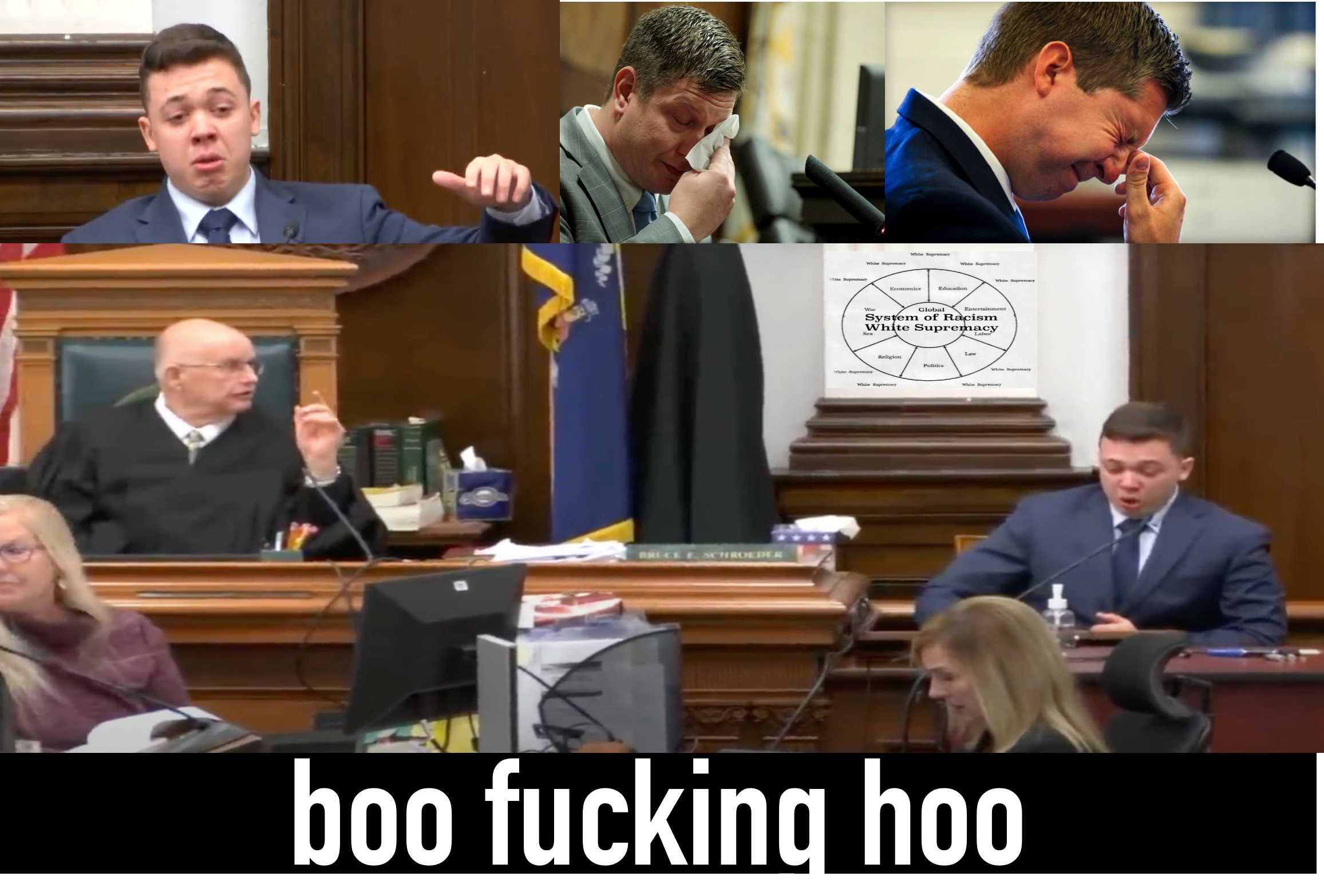The Crying w/o Tears Trick in Support of the 'Kill NHGRS when I Want Defense:' Corpse Like Teen Does Fake Shaking and Crying on Witness Stand but Only Mucus Comes Out During Performance to White Jury
/IN PHOTO CORPSE/PUPPET LIKE TEEN CRIES ON DEMAND but WITHOUT TEARS DURING QUESTIONING BY HIS ATTORNEY. JUST LIKE THEY REHEARSED AND JUST LIKE OTHER WHITE MEN ON TRIAL FOR MURDERING BLACK MEN IN PUBLIC; CHICAGO COP JASON VAN DYKE (WHO USED A NAPKIN AS An effective PROP TO WIPE HIS DRY FACE) AND CINCINNATI COP SAM DUBOSE WHO CRIED W/O TEARS (but partly covered his face and put his head down) IN FRONT OF HIS OVERWHELMING WHITE JURY DURING HIS FAKE TRIAL. ENjoy the rest of their show!
Apparently, RIttenhouse’s defense other than his ‘white jury, we can murder Blacks when we want to and when needed to survive b/c Blacks threaten our survival defense’ is self-defense of another person’s property - which is a pretty weak legal defense since the law of defense of property in Wisconsin does not allow a person to intentionally use force intended or likely to cause death or great bodily harm for the sole purpose of defense of property. [see jury instruction below]. But there is no need for any rational thought when you have racism white supremacy, a white judge and jury and skin color is involved. As explained by Osho Rajineesh "A mind that is filled with belief is a mind which can project anything according to the belief. When you see things always remember this." [MORE] In the presence of Blacks racists cannot see things as they really are. As explained by Osho Blynd, Racism white supremacy is a virus in the mind. [MORE]
WIS JI-Criminal 860 Privilege: Defense of Another's Property — § 939.49(2) (Wisconsin Jury Instructions - Criminal (2020))
860 PRIVILEGE: DEFENSE OF ANOTHER'S PROPERTY — § 939.49(2)
Defense of Another’s Property
Defense of the property of another is an issue in this case. The law of defense of property allows the defendant to threaten or intentionally use force to defend the property of another only if:
· the defendant believed that there was an unlawful interference with the property of (name of third person) ; and,
· the defendant believed that the property belonged to (a member of the defendant's immediate family or household) (a person whose property the defendant has a legal duty to protect) (a merchant who employs the defendant) (a library that employs the defendant); and,
· the defendant believed that (name of third person) was entitled to use or threaten to use force to defend his property; and,
· the defendant believed that the amount of force used or threatened was necessary for the protection of (name of third person) 's property; and,
· the defendant's beliefs were reasonable.
The law of defense of property does not allow a person to intentionally use force intended or likely to cause death or great bodily harm for the sole purpose of defense of property.[i]
Determining Whether Beliefs Were Reasonable
A belief may be reasonable even though mistaken. In determining whether the beliefs were reasonable, the standard is what a person of ordinary intelligence and prudence would have believed in the defendant's position under the circumstances that existed at the time of the alleged offense. The reasonableness of the defendant's beliefs must be determined from the standpoint of the defendant at the time of his acts and not from the viewpoint of the jury now.
State’s Burden of Proof
The State must prove by evidence which satisfies you beyond a reasonable doubt that the defendant was not acting lawfully in defense of the property of another
Jury’s Decision
If you are satisfied beyond a reasonable doubt that all ____ elements of _________[ii] have been proved and that the defendant did not act lawfully in defense of property of another, you should find the defendant guilty.
If you are not so satisfied, you must find the defendant not guilty.
COMMENT
Wis JI-Criminal 860 was originally published in 1962 and revised in 1994. This revision was approved by the Committee in April 2005.
The 1994 revision of this instruction changed the format to allow integrating the description of defense of property with the instruction for the crime charged. See the Comment to Wis JI-Criminal 800.
WIS JI-Criminal 860 Privilege: Defense of Another's Property — § 939.49(2) (Wisconsin Jury Instructions - Criminal (2020))










































































































































































































































































